A crucial issue today is how to galvanise and manage a massive, inclusive lifelong learning movement involving all sectors of society and the economy, from local through to global. This will help drive a new green and digital world, where skills demands and worlds of work are constantly changing, and where people will need to be adaptable and resilient.
Is this possible? It did not always seem so at the European Training Foundation (ETF) and UNESCO conference on “Building lifelong learning systems: Skills for green and inclusive societies in the digital era”, held virtually from 21-25 June in collaboration with the EBRD, ILO and UNICEF.
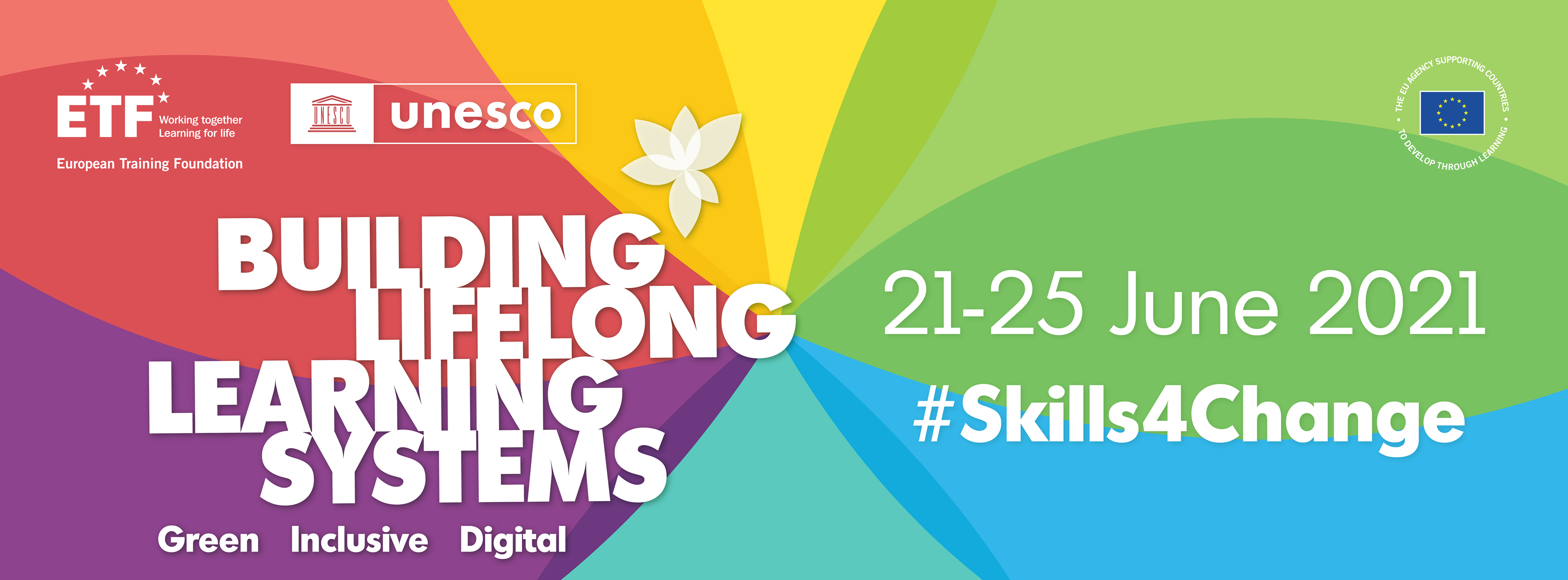
We know from the pandemic how unfettered collaboration and sharing enabled one of humanity’s great scientific achievements – vaccines against a common threat within a year. We know from the European Union and United Nations sustainability campaigns how powerfully public policy can shape the future. And we know of a vast array of innovative lifelong learning (LLL) strategies, activities and actors around the world, from which to learn.
The heart of the matter is an imperative for new and more skills. This is uncontested. More than half a century after a need for lifelong learning was identified, there is still not nearly enough of it and formal education systems have not adapted to satisfy the need. In the gap have arisen a myriad of initiatives – from the private sector, civil society, public authorities and individuals – but they are fragmented and need to be scaled up dramatically
“This is an exciting moment for education and training policies – a moment where reform is not only a vision but is tangible and could touch all spheres of life,” Cesare Onestini, director of the ETF, told the conference.
More than that:
“System change is needed.”
The world faces challenges of globalisation, digitalisation, climate change and sustainability, alongside post-COVID-19 recovery and regeneration. The vision for system change is green, inclusive societies that reap the technologies of the digital era.
“Lifelong learning is the engine that will allow us to move towards change that tangibly benefits the many. That is the goal – and the challenge,” said Onestini.
According to Stefania Giannini, Assistant Director-General of UNESCO:
“A sustainable, green and fair recovery hinges on political commitment to invest in quality education and skills, and expanded opportunities for reskilling and upskilling throughout life.”
It was agreed that political will and investment need to be accompanied by new mindsets, cultural change and inclusiveness, greater international collaboration and a socio-economic ‘revolution’ to deliver skills on the scale required.
The conference asked three framing questions:
- What is the purpose of system change and what skills are required?
- What are the features and deliverables of well-performing lifelong learning systems?
- And how might we manage and actively direct change to better support genuine LLL transformation to the benefit of all?
The purpose of system change
With the pace of transformation, new global awareness and solidarity around existential threats such as the pandemic and climate change, and green and digital transitions underway, the future is suddenly now.
“Work evolution has become a revolution,” said ETF labour market expert Iwona Ganko. “It’s about being digitally savvy, adaptable and resilient against a backdrop of technological and climate change, accelerated by the pandemic."
Technological developments are changing industrial processes completely, making it “the greatest change since the steam engine”.
Technology is driving new worlds of work and many jobs are forecast to disappear while new jobs appear, said Andreas Schleicher, Director for Education and Skills at the OECD.
“We used to learn to do the work, now learning is the work.”
To match demographic growth and keep employment rates stable, 600 million new jobs must be created, especially in Africa and Asia, said Riccardo Savigliano of UNIDO. As the EU understands well, and as the pandemic has so graphically illustrated, countries and regions are not isolated: like that butterfly flapping its wings, what happens elsewhere will eventually impact here.
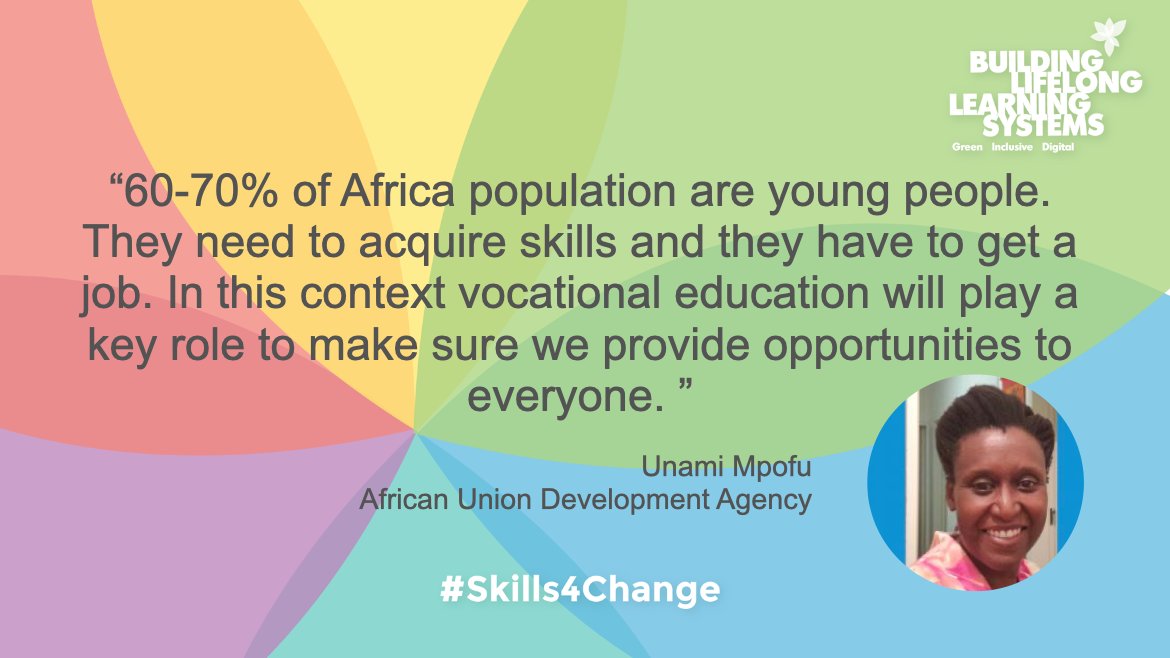
New jobs will need new skills. This is also an organisational skills challenge. Many small and medium enterprises have yet to understand the opportunities and risks attached to skilling, upskilling and reskilling.
Gig and platform work, because of its globality and low entry barriers, have opened work possibilities outside the formal job sector, and to some previously disadvantaged groups such as the disabled. But the work is vulnerable and the burden of skills has shifted to individuals, so it is critical to develop state and industrial support eco-systems, and new tax and funding models.
Several speakers emphasised the difficulty of identifying skills needed. An analysis by the European Centre for the Development of Vocational Training (CEDEFOP) of 100 million online job vacancies, identified no fewer than 3,000 separate skills. There has been a dramatic shift towards digital skills – basic and advanced – while skills linked to information processing are in danger from artificial intelligence. Skills such as leadership and creativity are more future-proof, and there will be high demand for skills that are related to social, empathy and health care. Lest we forget the human side.
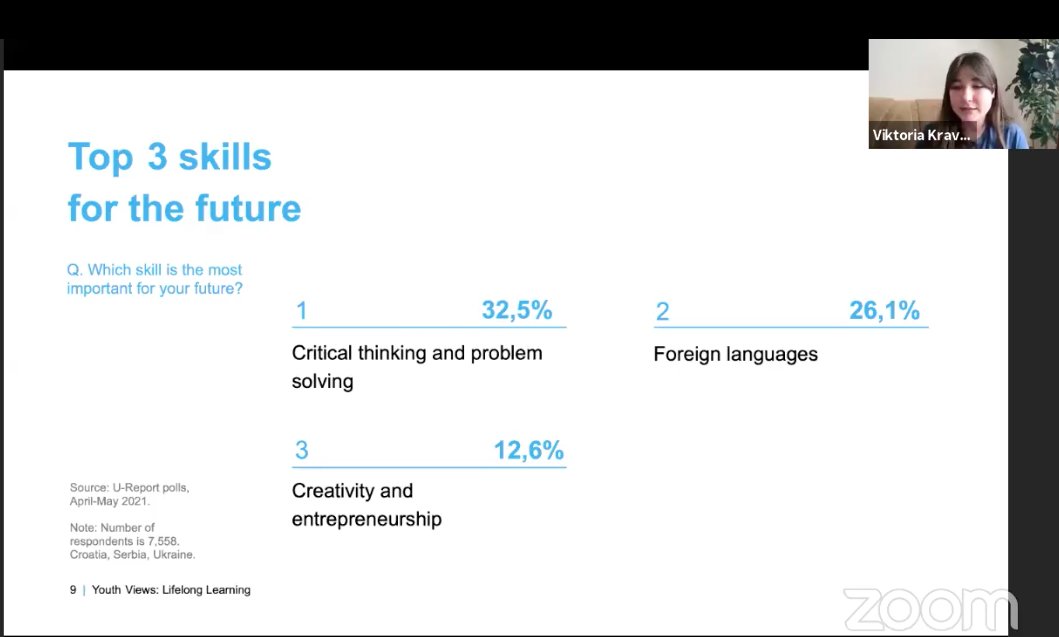
Young people understand the realities of changing skills. They attach importance to critical thinking, problem-solving and foreign language skills as well as emotional intelligence, social skills, adaptability and lifelong learning. At the same time, OECD research found that half of 15-year-olds aspire to careers that will no longer exist in future.
Schools appear to have lost touch with reality. An ETF and UNICEF survey published during the conference found that 56.1% of youth consulted say school had prepared them for future studies or employment ‘a little’ or ‘not at all’.” Well over two-thirds (42%) listed internet and social media as primary career choice sources, parents and family (27%) and friends (8%).
Building lifelong learning systems, and managing change
This all calls for urgent policy change and action.
Successful lifelong learning systems are inclusive, accessible and provide high quality learning that equips all people with key competencies for careers and well-being. They reach more widely and deeply than formal education and training to encompass multiple sectors of government, society and the economy, and people in all their diversity and difference.
It is essential to empower people to become lifelong learners by: making learning appealing and useful for all; building bridges between formal, non-formal and informal learning; and helping learners navigate diverse training offers and the changing world of work.
Classical forms of training require a rethink, to become more creative in engaging people. Speakers presented a multitude of impactful initiatives and activities across ETF partner countries that are not only advancing lifelong learning but in many cases responding to the green transition.
However, there are major constraints. Schools can be constrictive rather than creative. Many teachers lack capacity and need motivation and professional development. Initiatives are fragmented and partnerships are rare. There can be lack of cooperation between levels and providers of education, and different ways in which people view the world of learning. LLL is not generally prioritised by public authorities or the private sector, and is under-resourced.
Learning has been changing, but the pandemic prompted a radical shift online and further blurred boundaries between formal and informal learning. We must embrace this blurring and create synergy between old and new learning methods, institutions and environments.
As challenging is finding the resources to implement new approaches. Public authority and private sector investment in lifelong learning will likely never cover all that is needed. Participants outlined creative resourcing initiatives including state and industry-backed Individual Learning Accounts that enable a personal right to lifelong learning, and the Social Impact Bond in Belgium.
Some local initiatives just wanted autonomy from stifling bureaucracies in order to operate efficiently and seize opportunities. Entela Kaleshi, of the Albania Institute for Change and Leadership, argued for a greater role in LLL for civil society organisations, which are frequently close to the needs of people and can give voice to the excluded. CSOs bring soft skills, advocacy and activities and, she said: “They bring you.”
ETF senior specialist Siria Taurelli said LLL is first of all about partnerships, which require a design. Partnerships can forge new practices and consolidate capacities.
In lifelong learning, partnerships ought to involve state and non-state actors, including non-conventional actors that normally do not inform policy thinking.
Key to successful lifelong learning is monitoring and evidence-based policy. Since everybody must be involved in LLL systems, everyone must also be involved in monitoring – both in collecting data and using the results. Involving more sources will yield more data. Monitoring should be used to inform as well as assess policies and initiatives. There is already too much information, and we must tread carefully in balancing quantity with quality.
Inclusion and the green transition
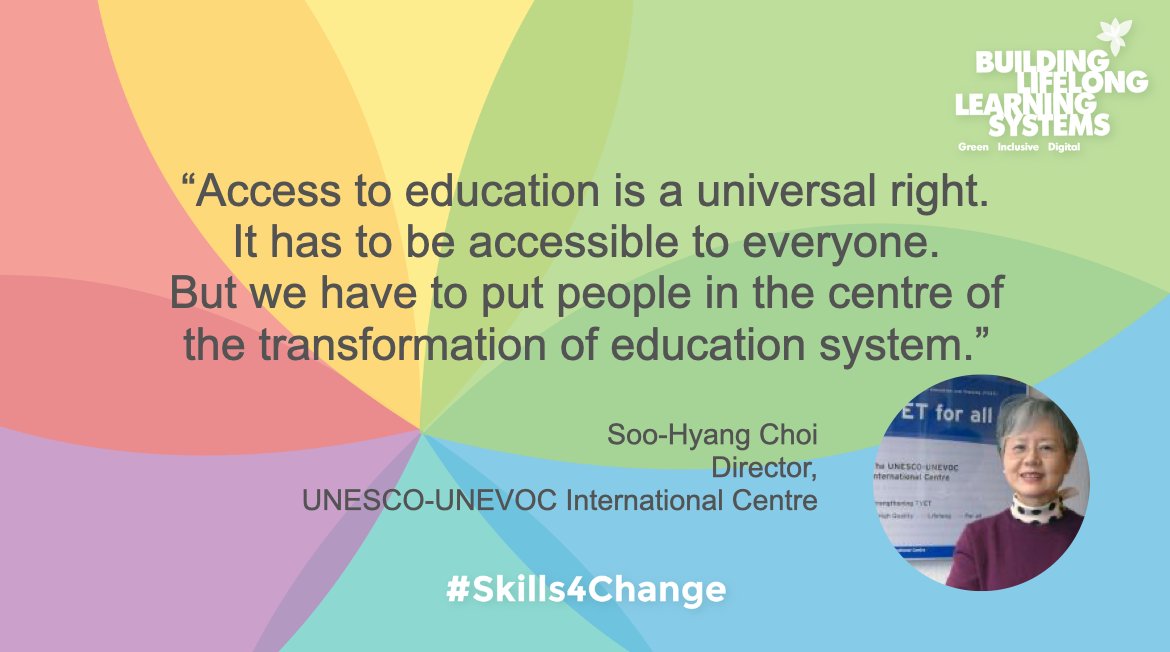
The issue of inclusion is complex and diverse, and was dominant at the conference. No one must be left behind. There were inspiring examples of how closed education systems around Europe are being cracked open to allow people back in who had been left out, to allow people to move sideways as well as ahead, to recognise the enormous efforts people make to acquire skills outside formal education, and to make learning more relevant to individuals and societies.
Participants agreed that all people with a stake in education should be involved in decision-making, and that flexible approaches are needed that cover non-formal forms of learning. Inclusion must be a basic principle and right – not an afterthought – and non-formal learning must be validated to recognise people’s achievements and motivate them to learn more. There is a massive revamp ahead for recognition of prior learning and recognition of micro-qualifications.
Borhene Chakroun, Director of Policies and Lifelong Learning Systems at UNESCO, called for urgent action to tackle lack of equity and inclusion.
“We need to cooperate more closely than ever before to make sure we leave no one behind. Enough is enough.”
There is no doubt about the importance of inclusion; surveys have shown that people with the lowest levels of education also have the lowest participation in lifelong learning. Who needs the most, benefits the least.
An ETF-UNESCO study on Building a resilient generation in Europe and Central Asia, published during the conference, found that nearly two-thirds of some 8,000 polled young people from six countries had experienced or witnessed some form of discrimination.
Christina Bacalso of UNICEF said that the greatest future generational dividend we can harvest will come from investment in anti-discrimination now.
Meanwhile, the EU’s Green Deal initiative is pumping interest and resources into activities that support protection of the environment and sustainability, infusing green principles and actions into policies in all sectors including education and training.
The green transition is being successfully pioneered at grassroots by a myriad of individual innovations, said Anastasia Fetsi, Lead Human Capital Development Expert at ETF – but these need to be scaled up and structured into a systemic programme of innovation and change. This requires existing education systems to be aligned with green priorities at national and international levels, to deliver the new skills that are needed.
“The green transition needs mindsets, innovation and skills that can only be achieved through policies based on long term thinking; and embedding skills for greening and sustainability in all types of education and training,” she said.
It is also necessary to integrate a skills dimension into strategic plans; draft policies for large-scale action; and work in partnerships.
Directions for the future
Getting back to the beginning, it is exciting to envisage a more muscular role for the international community in supporting the scaling up of lifelong learning, drawing inspiration from collaborative experiences of the pandemic and the proven ability of strong policies with resources to shape the future.
For the ETF, said Cesare Onestini, future action should be guided by the need for all stakeholders to pull in the same direction.
“We need to know where we want to go.”
For the ETF this means a stronger policy advice function supported by monitoring frameworks.
He outlined three priorities going forward. One is to support partner country efforts to design and implement inclusive-by-design education systems. A second is to promote and build change with all partners and stakeholders through impact-driven LLL policies. And a third is to expand the horizon of work on skills development.
Analysis of ETF Torino Process research suggests: identifying and prioritising policy areas of relevance for LLL; accelerating national strategic plans; boosting the ability to collect and interpret evidence – including before new policies are forged – and looking beyond formal education to a new generation of governance and financing arrangements.
Koen Doens, Director-General for International Partnerships of the European Commission, described three key global trends – a worldwide crisis in education exacerbated by COVID-19, explosive population growth, and new technologies that are presenting huge challenges – and opportunities – to jobs and the labour market.
“The definitive challenge is how to tap into opportunities while also addressing fault-lines.”
Europe is responding with massive initiatives to distribute vaccines globally, as a move to get children and teachers back to school; and by ramping up education and training investment and opportunities in Europe, the European neighbourhood and across the world.
At a recent European Commission social summit in Porto, the target was set to increase the number of adults in training from 37% now to 60% in 2030 and the number of people with basic digital skills from 42% to 80%.
Soo-Hyang Choi, Director of the UNESCO-UNEVOC International Centre for Technical and Vocational Education and Training (TVET), outlined three key approaches – data provision, capacity building and peer learning – that are among very many that the UN agency has underway.
Speakers agreed that international cooperation alone is not enough. There needs to be action in all countries – by public authorities, the private sector and civil society. Srinivas Reddy, Chief of the Skills and Employment at the ILO, believes LLL can be achieved through social dialogue.
“It is a shared responsibility between individuals, enterprises and governments.”
Wrapping up the conference, Fetsi said that the hard work starts now:
“The hardest work will be to change the mindsets of all of us, to see things differently. We have to change things – the things that don’t work anymore. But we must also give value to what we have.”
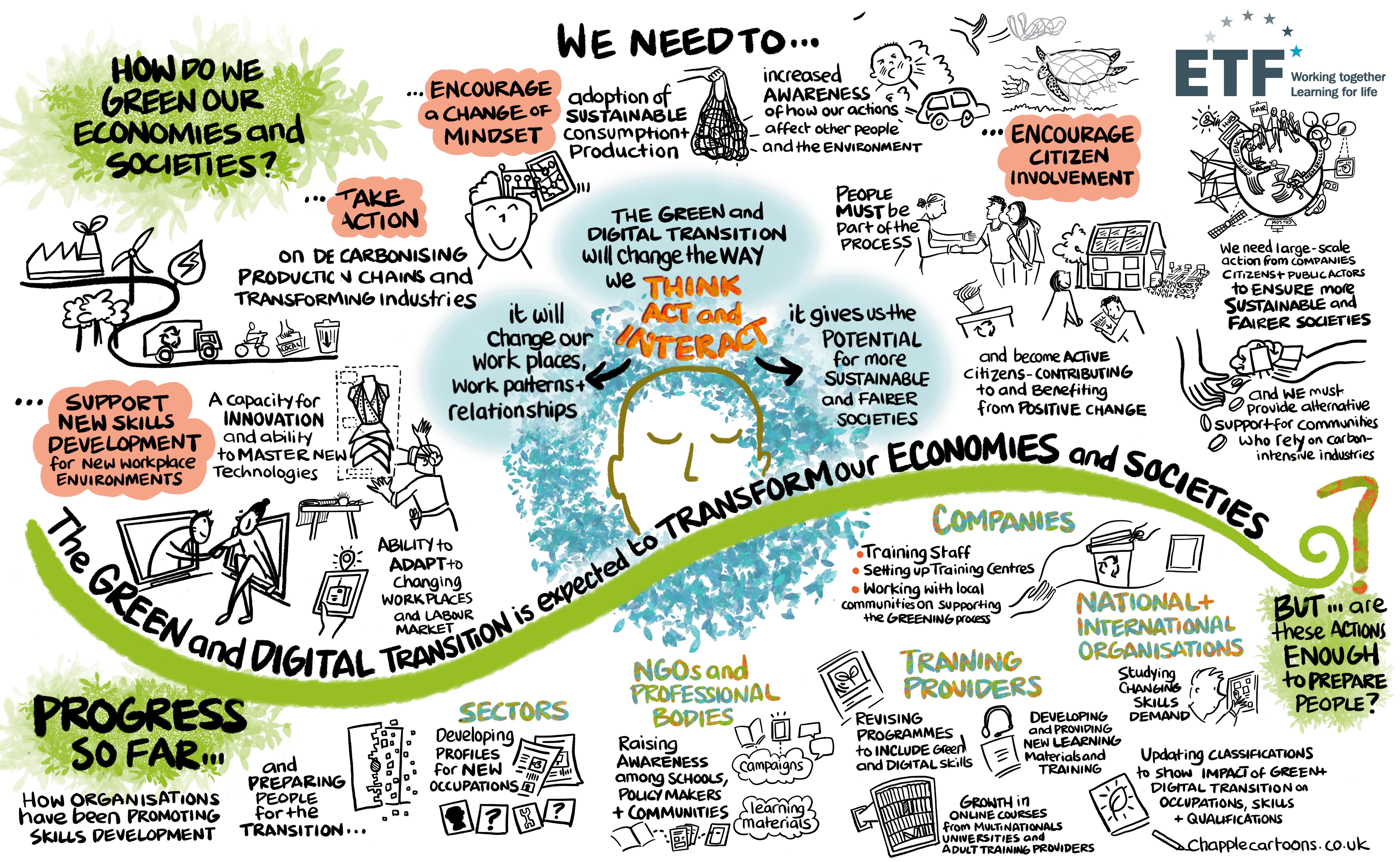

Please log in or sign up to comment.